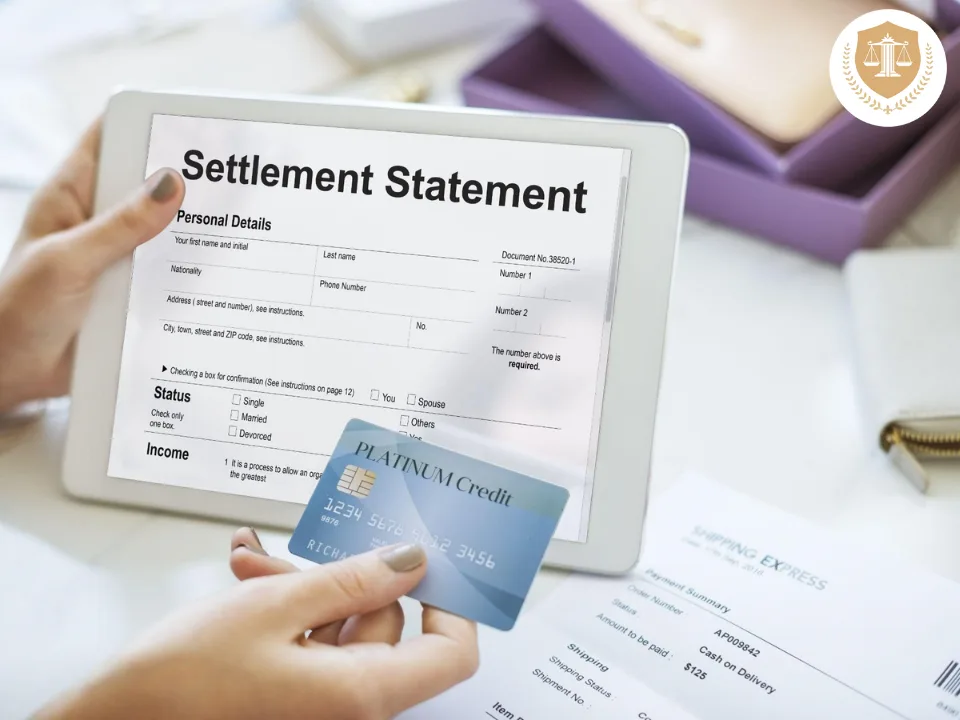Settlement in Credit Card is a process that allows individuals and businesses to resolve outstanding credit card debt or transaction payments. Whether you’re struggling with unpaid balances or a merchant navigating payment processing, understanding how settlement works is crucial. For individuals, credit card settlement can help reduce debt through negotiations with banks.
For businesses, it ensures smooth transaction processing and fund transfers. But how does it impact your Settlement in Credit Card score, financial future, or cash flow? This guide will walk you through everything you need to know—covering benefits, risks, legal aspects, and alternatives—so you can make informed financial decisions.
Quick Answer
Settlement in Credit Card lets you pay a reduced amount to close your debt, but it lowers your credit score.
What is Settlement in Credit Card?
Credit card settlement is an agreement between a borrower and the bank to pay off a credit card debt for less than the total amount owed. This is usually an option for people struggling with repayments. For businesses, settlement refers to the process of finalizing credit card transactions and transferring funds. While settlement can help reduce debt, it may impact your credit score. Understanding how it works can help you decide if it’s the right financial choice for you.
Can You Reverse a Credit Card Settlement After It’s Finalized?
Once a credit card settlement is finalized, reversing it is nearly impossible. Banks consider settled accounts as closed transactions, meaning you can’t renegotiate the amount. However, if you believe there was an error in the settlement terms or a miscommunication, you may request a review. In rare cases, banks may allow a modification, but it usually involves repaying the remaining balance. Before settling, ensure you fully understand the terms, as reversal options are extremely limited.
Also read: Cybercrime Law UAE: Key Laws & How They Protect You
How Does Settlement in Credit Card Work?
For individuals, credit card settlement involves negotiating with the bank to pay a reduced amount in a lump sum or installments. The bank may accept this to recover part of the debt instead of risking full non-payment. For businesses, settlement refers to the process of clearing transactions—when funds move from the customer’s bank to the merchant’s account. Whether settling debt or processing payments, understanding the steps involved helps avoid financial pitfalls and ensures smooth transactions.
How Can You Rebuild Your Credit Score After a Credit Card Settlement?
After settling a credit card debt, rebuilding your credit score takes time and effort. Start by making all future payments on time, as payment history is a major factor in credit scores. Keep your credit utilization low—ideally below 30% of your available limit. Consider using a secured credit card or a credit-builder loan to demonstrate responsible financial behavior. Regularly monitor your credit report for errors and dispute inaccuracies. With patience and discipline, your credit score will improve over time.
Types of Credit Card Settlements
| Aspect | Details |
|---|
| Definition | A process where a cardholder negotiates to pay a reduced amount instead of the full outstanding balance. |
| Impact on Credit Score | Lowers credit score as it is reported as “settled” instead of “paid in full.” |
| Who Can Apply? | Individuals struggling with high credit card debt and unable to make full payments. |
| Alternatives | Debt consolidation, balance transfer, loan refinancing, and debt counseling. |
| Process | Contact the bank → Negotiate terms → Get a written agreement → Make payment → Confirm settlement. |
| Pros | Reduces overall debt, prevents legal action, provides financial relief. |
| Cons | Hurts credit score, may have tax implications, banks may charge fees. |
| Time Required | A few weeks to several months, depending on negotiation and approval. |
| Best Practices | Get a written agreement, check credit report after settlement, explore alternative options. |
There are different types of credit card settlements depending on your situation. Lump-sum settlement allows you to pay a reduced amount all at once, while structured repayment plans let you pay in smaller installments. Voluntary settlement happens when you negotiate directly with the bank, whereas court-mandated settlement may occur in legal cases. For businesses, settlements involve either batch settlements (processing multiple transactions at once) or real-time settlements (instant processing). Understanding these options helps in making better financial decisions.
What Are the Legal Rights of Consumers in Credit Card Settlement?
Consumers have legal protections when settling credit card debt. Banks must provide a written agreement outlining the settlement terms, and they cannot force you into a settlement without consent. Debt collection agencies must follow fair debt collection practices, avoiding harassment or threats. In some cases, consumers can challenge unfair settlement terms or incorrect credit reporting. Knowing your rights can help you negotiate a fair settlement and avoid being taken advantage of by banks or debt collectors.
Pros and Cons of Credit Card Settlement
Pros: Credit card settlement helps reduce outstanding debt, making it easier to manage finances. It can prevent legal action and offer relief from high-interest rates. For businesses, quick settlement ensures smooth cash flow.
Cons: Settling debt may hurt your credit score, making future loans harder to get. Some banks charge fees or taxes on the forgiven amount. Businesses may face delays in fund transfers. Weighing these pros and cons helps in making a smart financial choice.
Can Businesses Negotiate Credit Card Processing Fee Settlements?
While credit card settlement is often discussed for individuals, businesses can also negotiate settlements related to credit card processing fees. Payment processors charge various fees for transactions, and in cases of disputes or financial hardship, businesses may request reduced fees or temporary waivers. Some companies negotiate lower interchange rates or switch to high-volume processing plans for better terms. Understanding these options can help businesses save money while maintaining smooth payment operations.
How Credit Card Settlement Affects Your Credit Score
Settling a credit card debt for less than the full amount can negatively impact your credit score. Banks may report it as a “settled” account instead of “paid in full,” signaling financial difficulty to future lenders. This can lower your creditworthiness and make it harder to get loans. However, over time, responsible credit use—like paying bills on time and keeping balances low—can help rebuild your score. Understanding these effects helps in making informed financial decisions.
Alternatives to Credit Card Settlement
If settlement isn’t the best option, consider alternatives. Debt consolidation allows you to merge multiple debts into one with a lower interest rate. Balance transfer credit cards offer a temporary 0% interest period to help repay debt faster. Negotiating a lower interest rate with your bank can make payments more manageable. Debt counseling services provide expert guidance on managing finances. Exploring these options can help you reduce debt while protecting your credit score.
Steps to Settle Credit Card Debt
Settling credit card debt involves a few key steps. First, assess your finances to determine how much you can afford to pay. Next, contact your bank to negotiate a settlement offer. If an agreement is reached, get it in writing to avoid future disputes. Once the payment is made, request a confirmation letter stating the debt is settled. Finally, monitor your credit report to ensure the account is updated correctly. Following these steps can help you settle debt smoothly.
Common Mistakes to Avoid in Credit Card Settlement

When settling credit card debt, avoid these mistakes. Not getting a written agreement can lead to future disputes. Paying without negotiation may result in higher payments than necessary. Ignoring tax implications—forgiven debt may be taxable. Failing to check your credit report can cause errors that hurt your credit score. Relying on unverified debt settlement agencies may lead to scams. Being aware of these mistakes can help you navigate the process safely and effectively.
FAQS: settlement in credit card
Does Settlement in Credit Card affect my credit score?
Yes, settling a credit card for less than the full amount can lower your credit score, as it is reported as “settled” instead of “paid in full.”
Is credit card settlement a good idea?
It can be a good option if you’re struggling with debt, but it’s important to consider the impact on your credit score and explore alternatives first.
How long does it take to settle a credit card debt?
The process can take a few weeks to several months, depending on the bank’s policies and your negotiation terms.
Can I negotiate a credit card settlement myself?
Yes, you can contact your bank directly to negotiate a settlement or hire a debt settlement agency for assistance.
Are there any fees for credit card settlement?
Some banks charge fees, and the forgiven amount may be taxable. Always check the terms before proceeding.
Final Thoughts on Settlement in Credit Card
Credit card settlement can be a helpful option for those struggling with debt, but it’s important to understand its impact. While it reduces what you owe, it may lower your credit score and have tax consequences. Exploring alternatives like debt consolidation or negotiation can sometimes be a better choice. If you decide to settle, follow the right steps and avoid common mistakes. Making informed financial decisions will help you regain control of your finances and work toward a debt-free future.

